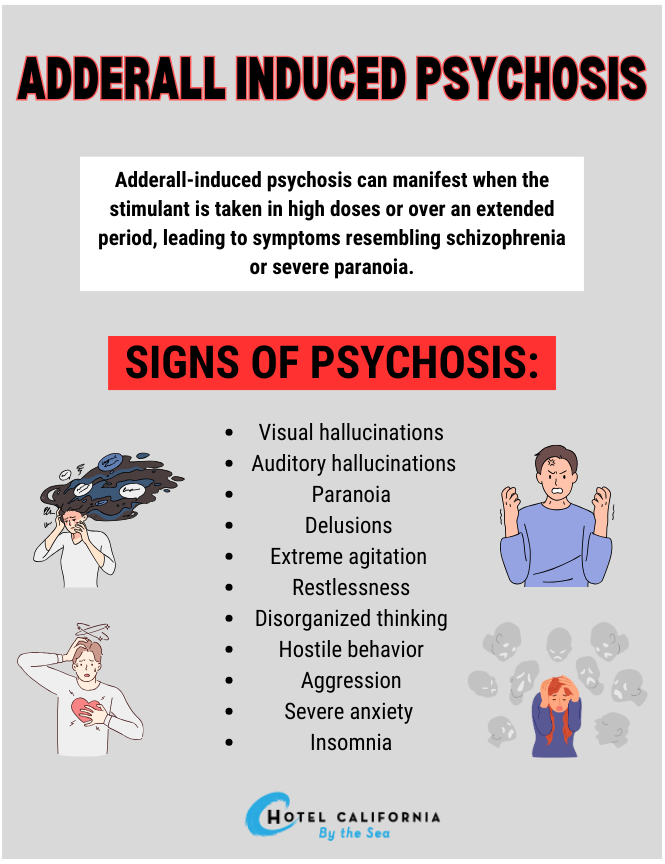Adderall and Psychosis
Adderall is one of the most commonly prescribed prescription stimulant medications used to treat symptoms of attention deficit hyperactivity disorder (ADHD). It is a safe and effective medication when clinically prescribed. In some cases, there will be potential for abuse of the medication which can lead to dangerous side effects including psychosis. The development of psychosis from Adderall misuse or stimulant medication misuse is a rare occurrence. The uncommon side effect increases in risk mostly in those who misuse and abuse the substance.

Stimulant medications have been used for decades in the treatment of ADHD. It is often started at a young age to help young children and students. It has a good record of dependability and safety when used in the correct therapeutic dosage. Studies have also shown that treatments with stimulant medications reduce the risks of illicit substance use by an estimated 60% in ADHD patients compared to ADHD patients who were untreated.
Research has found that the risk of onset psychosis was found in about 1 in 660 patients who received a prescription for stimulants treating ADHD. The risk of psychosis was two times as high for patients who started taking prescription amphetamines when they were young. When a person experiences a drug-induced psychosis, it refers to a condition in which the use of a substance can produce symptoms resembling or similar to that of psychosis. The link between stimulant amphetamines and psychosis isn’t a new discovery. In fact, researchers have been studying this phenomenon for years due to the rise in addiction rates to stimulant amphetamines such as Adderall.
What is Psychosis?
Psychosis is characterized as an abnormal state of mind with the inability to recognize reality. The person might experience irregular thoughts and perceptions of their reality. The person will also have a difficult time distinguishing between what is real and what is not real. Symptoms of psychosis include experiencing delusions, hallucinations, having trouble thinking clearly, inappropriate behavior and sometimes disorganized speech. During a psychotic episode, a person can also show symptoms of impaired judgment, extreme mood swings and the inability to engage in normal social interactions.

What is the relationship between Adderall and Psychosis?
Research and studies have shown the likely cause of Adderall-induced psychosis might have something to do with the medication’s ability to release high levels of the neurochemical dopamine. Adderall increases levels of dopamine in the brain. In high doses of Adderall or during recreational use of stimulant amphetamines, the drug can begin mimicking signs of psychosis. When you flood the brain with dopamine, you can potentially cause a person to develop into a state of psychosis. With increased levels of dopamine in the brain, the body can begin mirroring symptoms and patterns of schizophrenia. This can also make it more difficult to distinguish between if a psychotic episode is caused by an early manifestation of schizophrenia spectrum disorder or if it is drug-induced.
Over the years there has been a high increase in prescription stimulant use in the United States. This is especially seen in young adults. In a study published in JAMA Psychiatry, researchers found prescription rates for stimulant amphetamines used in the treatment of ADHD, increased 30% from 2018 to 2022 in people between the ages of 20 to 39. Another factor contributing to the increase in prescription stimulant use may be due to the overdiagnosis of ADHD or the overprescribing of Adderall.
One of the main causes of Adderall-induced psychosis seems to stem from taking high doses of the medication. In a study at McLean Hospital, a teaching hospital at Mass General Brigham in Boston, researchers found that patients who took high doses of more than 40mg of Adderall, 100mg of Vyvanse or 30mg of dextroamphetamine, were about 5 times more likely to develop psychosis compared to patients who did not take stimulant amphetamines. Other studies also reiterated the fact that a high dose of stimulant amphetamines causes a high risk for psychosis. One study showed that users exposed to any type of prescription amphetamine had a 63% likelihood of showing signs of psychosis. In those who were exposed to high doses of amphetamines, the risk was bumped up to 81%. Despite these alarming findings on the risks of high amphetamine dosage, the FDA still does not have a recommended upper limit for Adderall.
Signs of Adderall Psychosis
- Hallucinations – auditory and visual
- Paranoia
- Delusions
- Extreme changes in behavior
- Suspiciousness
- Difficulty thinking clearly
- Social withdrawal and antisocial behavior
- Unusual ideas or feelings
- Diminished sense of self-care
- Disrupted sleep and insomnia
- Confused speech
- Aggression and agitation
- Mania
- Anxiety
- Lethargy
Check Your Insurance Coverage for FREE
Find out if your insurance covers addiction treatment in minutes. We accept most insurance!
Risk factors for developing Adderall-induced Psychosis
- Sleep deprivation – Adderall can sometimes cause users to experience sleeping problems and develop insomnia. People with ongoing sleep deprivation are more prone to developing Adderall-induced psychosis.
- History of mental health conditions – People who have mental health conditions such as bipolar disorder, psychotic disorders or schizophrenia and schizoaffective disorder are at higher risk for developing psychosis. This can manifest in the form of manic episodes and extreme paranoia.
- Dosage – Research has found that doses of stimulant amphetamines such as Adderall are directly linked with the development of psychosis. This is most commonly seen in people who abuse and become addicted to the drug.
- Genetics – Those who have a family history of psychosis are at a higher risk for developing the symptoms when taking Adderall. There are known genes that can increase a person’s risk of psychosis.
- Stress – High levels of stress contribute to the development of psychosis when taking Adderall.
- Other drug use – Those abusing Adderall along with other substances such as alcohol, benzo and opioids are at an increased risk for developing psychosis.
How long does Adderall-induced Psychosis last?
The duration of Adderall-induced psychosis varies for each user. For the majority of users, Adderall psychosis will last a short time, a day or less. Depending on medical and environmental factors, most of the symptoms will resolve once drug usage has stopped. In rare cases, symptoms of psychosis can last for weeks or even months. This is when medical attention will be required to treat long-term side effects.
Reach out to Hotel California by the Sea
We specialize in treating addiction and other co-occurring disorders, such as PTSD. Our Admissions specialists are available to walk you through the best options for treating your addiction.
Treatment of Adderall Abuse and Adderall-induced Psychosis
Adderall abuse and addiction are more common than people may realize. With the rise in overdiagnosis and overprescribing medications, more and more young people are developing dangerous symptoms from stimulant amphetamines. One alarming symptom is the development of Adderall-induced psychosis. It affects those who abuse the drug and take higher doses. Amphetamine toxicity has been linked to symptoms of psychosis that often mimic other psychosis-related mental health conditions such as schizophrenia. Behavioral health treatment programs such as Hotel California by the Sea provide overall treatments for those struggling with substance use disorders. Especially for those who have become addicted to Adderall.
We provide treatment at all levels of care including detox, residential, PHP and IOP. Our program includes evidence-based treatment methods such as MAT, CBT, DBT and family therapy. Through a combination of medical-based and psychiatric-based treatment, all clients will have the opportunity to better understand their addiction and how to overcome it. Hotel California by the Sea is dedicated to helping our clients achieve sobriety and maintain long-term recovery.
References:
https://www.healthcentral.com/condition/adhd/adderall-psychosis
https://www.ncbi.nlm.nih.gov/pmc/articles/PMC9403214
https://www.rehabcenter.net/adderall/psychosis/
https://news.harvard.edu/gazette/story/2024/09/high-doses-of-adderall-may-increase-psychosis-risk/
https://www.choosingtherapy.com/adderall-psychosis/
